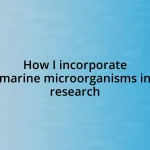Key takeaways:
- Marine animal byproducts, such as fish oil and collagen, have significant nutritional benefits and diverse applications in cosmetics and food industries.
- Sustainable sourcing and innovation are essential for utilizing marine byproducts without harming marine ecosystems, exemplified by practices like aquaculture and biodegradable plastics from waste.
- The market for marine byproducts is growing due to rising consumer demand for sustainable products, with innovations expanding into pharmaceuticals and biofuels.
- Future potential includes the development of bio-based materials from fish waste and bioengineering marine enzymes for eco-friendly industrial processes.

Introduction to marine animal byproducts
Marine animal byproducts are fascinating extensions of creatures from the ocean, often overlooked despite their diverse applications. When I first encountered marine-derived materials, like fish scales and shells, I was struck by how these remnants could be transformed into valuable products. Have you ever paused to consider what happens to the parts of marine animals that we might discard?
From cosmetics to nutritional supplements, marine byproducts play a significant role in many industries. I remember visiting a facility that processes fish waste and turning it into fish oil; it was inspiring to see how something often regarded as waste could be repurposed into something beneficial. This focus on sustainability really resonated with me, especially in today’s world where reducing waste is critical.
The journey of understanding marine animal byproducts also invites us to explore the ecological balance within our oceans. It makes me wonder: how can we further utilize these resources without compromising marine ecosystems? I believe the answer lies in responsible sourcing and innovation, and it’s a conversation worth having as we seek to build a more sustainable future.

Types of marine animal byproducts
When I began delving into the types of marine animal byproducts, I was surprised by their variety and versatility. For instance, I had no idea that fish skins could be made into gelatin, used in everything from desserts to capsule supplements. It’s fascinating to see how every part of a marine animal can serve a purpose rather than going to waste.
Here’s a brief overview of some prominent types of marine animal byproducts:
- Fish Oil: Extracted primarily from fatty fish, it’s rich in omega-3 fatty acids, known for their health benefits.
- Fish Meal: A high-protein feed ingredient made from fish waste, often used in aquaculture and animal feed.
- Marine Collagen: Sourced from fish skins and scales, it’s popular in beauty products and health supplements for its skin benefits.
- Chitin and Chitosan: Derived from crustacean shells, they are used in diverse applications including bioplastics and dietary supplements.
- Pearl Powder: Ground from pearls, this byproduct finds its way into cosmetics and traditional medicine for its believed rejuvenating properties.
Reflecting on these products, I remember a time when I stumbled upon a workshop showcasing how to create biodegradable plastics from shrimp shells. It was exhilarating to witness such innovation, turning what many consider refuse into something environmentally beneficial. This type of transformation reinforces my belief that we can always seek to innovate while showing respect for our marine ecosystems.

Nutritional benefits of marine byproducts
It’s fascinating to explore the nutritional offerings of marine byproducts. For instance, I learned how fish oil, a product that often gets overlooked, is packed with omega-3 fatty acids. These fatty acids are crucial for heart health and brain function, and I’ve personally incorporated fish oil into my diet after experiencing its positive effects on my energy and mood.
What really caught my attention is the power of marine collagen. Sourced from fish skins, it not only supports skin elasticity but also aids in joint health. After trying a marine collagen supplement, I was amazed to feel a noticeable difference in my skin’s hydration and overall appearance. It felt like I was creating an internal shield, promoting beauty from within.
Lastly, chitosan, derived from crustacean shells, is another remarkable marine byproduct. This natural fiber has been shown to support weight management and lower cholesterol levels. I remember discussing it with a nutritionist who mentioned it could be a useful addition to a balanced diet. It reinforces the idea that utilizing these byproducts isn’t just sustainable; it also brings a wealth of health benefits to our lives.
| Marine Byproduct | Nutritional Benefit |
|---|---|
| Fish Oil | Rich in omega-3 fatty acids for heart and brain health |
| Marine Collagen | Supports skin elasticity and joint health |
| Chitosan | Promotes weight management and lowers cholesterol |

Sustainable sourcing of marine products
Sustainable sourcing of marine products is essential for maintaining ecological balance while also tapping into the rich benefits of marine byproducts. I still remember visiting a local seafood market that showcased sustainable fishing practices. Seeing the pride fishermen had in using every part of the catch really inspired me. It wasn’t just about profit; it was about respect for the ocean and its resources. Doesn’t that shift in perspective make you appreciate your seafood choices so much more?
When I think about sustainability, I can’t help but reflect on my recent visit to an aquaculture facility. They demonstrated how they cultivate species like oysters and mussels, which actually improve water quality. I was amazed to learn that these bivalves filter the water and help maintain healthy ecosystems. The thought that my choice to consume these products could be contributing to a cleaner ocean was exhilarating. What if more consumers understood the impact of their choices?
Moreover, the innovation in utilizing byproducts from marine life has made sustainability even more exciting. Take the use of fish scraps in creating nutritious fish meal or incorporating shells into biodegradable plastics. I remember participating in a workshop where we crafted items using chitin—outcomes like compostable bags left me in awe. It really drove home the potential of transforming marine waste into something valuable, which offers us a pathway to reduce our environmental footprint. Isn’t it incredible how sustainable practices not only benefit our health but also the health of our planet?

Applications in food and cosmetics
The applications of marine animal byproducts in food and cosmetics are truly innovative. For example, I was pleasantly surprised to learn that fish gelatin is often used in food products, acting as a thickener and stabilizer. It’s amazing how something that might otherwise be discarded can enhance the texture and quality of our favorite treats, like gummy candies!
In cosmetics, marine byproducts shine through as well. I recently stumbled upon a beauty cream infused with seaweed extract, which promises to nourish and rejuvenate the skin. After trying it, I found my skin felt more revitalized and fresh, almost akin to a spa treatment in a jar. Can you imagine how the ocean’s natural ingredients can bring that much wellness into our daily routine?
Moreover, the intriguing use of algae in cosmetics has captivated me. These little powerhouses not only provide hydration but also possess antioxidant properties that help protect the skin from environmental damage. I remember chatting with a friend who swears by her algae-based serum after she noticed how it helped brighten her complexion. Isn’t it fascinating how marine-derived ingredients can improve beauty routines while promoting sustainability?

Market trends in marine byproducts
The market for marine byproducts has been on a fascinating upward trajectory, reflecting not just trends, but a growing appreciation for ocean resources. I recall attending a conference where experts emphasized how rising consumer demand for sustainable products has pushed companies to explore innovative uses for fish parts that were once overlooked. Have you ever considered how your choices as a consumer might influence these market dynamics?
Interestingly, the rise of plant-based diets and the clean label movement is also impacting marine byproduct markets. I remember chatting with a seafood supplier who shared how seaweed snacks and fish protein powders are gaining traction among health-conscious consumers. It’s a delightful irony that what was once considered waste can now serve as a source of nutrition and even a trendy health food!
Moreover, the incorporation of marine byproducts into various industries isn’t just limited to food and cosmetics. I’ve seen a surge in demand for marine-derived ingredients in pharmaceuticals and biofuels. At a recent sustainability fair, a startup showcased biodegradable products made from fish scales, and I felt a spark of hope seeing such creativity. Doesn’t it excite you to think about the endless possibilities when we look at marine life through a lens of innovation?

Future innovations in marine byproducts
As I ponder the future of marine byproducts, my mind races with potential innovations. Researchers are increasingly exploring the use of fish waste for bio-based materials, which could revolutionize packaging. Imagine walking into a store and finding environmentally-friendly packaging crafted from fish skin—how incredible would that be?
One particularly exciting area is the enhancement of nutrient extraction from marine sources. I recently learned about a project aiming to extract omega-3 fatty acids from fish byproducts for fortified foods. The idea that something as discarded as fish byparts can become a nutritional powerhouse gets me thinking: how often do we overlook the value in what we deem waste?
Additionally, the bioengineering of marine enzymes is on the rise, and it genuinely captivates me. I remember reading about a startup that’s developing enzymes from sea creatures to improve industrial processes, making them more efficient and eco-friendly. Envision a future where marine innovation might lead to cleaner water and greener technologies—what if we could harness nature’s wisdom to solve pressing global issues?
















